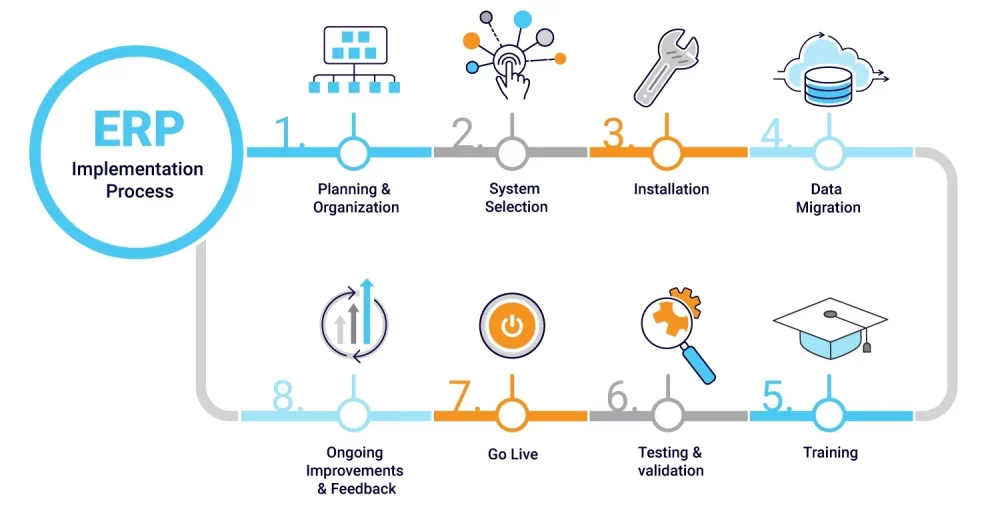Multi-Techno Integrated Solution

Table of Contents
ToggleMastering ERP Implementation: A 12-Step Roadmap for Success
Organizations increasingly turn to Enterprise Resource Planning (ERP) systems to streamline their operations, enhance productivity, and gain a competitive edge in today’s rapidly evolving business landscape. However, implementing an ERP system is a complex and challenging undertaking that requires careful planning, coordination, and execution. To ensure a successful ERP Implementation, businesses must follow a strategic roadmap of 12 critical steps. This article will explore each step in detail, providing valuable insights and practical tips to maximize the chances of a smooth and efficient ERP implementation process.
Checklist for the ERP Implementing
- Define Objectives and Scope
- Assemble a Competent Team
- Conduct a Thorough Needs Assessment
- Select the Right ERP Vendor
- Develop a Realistic Implementation Plan
- Prepare Data Migration and Integration Strategies
- Configure and Customize the ERP System
- Conduct Rigorous Testing
- Provide Comprehensive Training
- Plan for Change Management
- Go Live and Monitor Performance
- Continuous Improvement and Future Upgrades
1. Define Objectives and Scope
The first step in any Successful ERP Implementation is to define the objectives and scope of the project clearly. This involves identifying the specific goals the organization wants to achieve through ERP implementation, such as improved efficiency, better inventory management, or enhanced financial reporting. Additionally, defining the scope helps determine the business areas that will be impacted by the ERP system and sets boundaries for the project.
2. Assemble a Competent Team
Building a competent and multidisciplinary team is crucial for ERP implementation. This team should include representatives from various departments, including IT, finance, operations, and human resources. Each team member should possess the necessary expertise, experience, and commitment to contribute effectively throughout the implementation process.
3. Conduct a Thorough Needs Assessment
A thorough needs assessment evaluates the organization’s existing systems, processes, and workflows. This step helps identify pain points, inefficiencies and gaps the ERP System needs to address. It also enables businesses to align the ERP solution with their unique requirements, ensuring maximum effectiveness.
4. Select the Right ERP Vendor
Choosing the right ERP Vendor is a critical decision that can significantly impact the success of the implementation. Organizations should evaluate various factors, such as vendor reputation, product functionality, scalability, implementation support, and total cost of ownership. Engaging in thorough research, attending demos, and seeking recommendations from industry experts can help make an informed decision.
5. Develop a Realistic Implementation Plan
Creating a realistic and detailed implementation plan is essential for managing resources, setting timelines, and tracking progress. The plan should outline specific tasks, milestones, and dependencies, providing a roadmap for the entire project. It should also incorporate contingency measures to address unexpected challenges or delays.
6. Prepare Data Migration and Integration Strategies
Data migration is a critical aspect of ERP implementation. It involves transferring data from legacy systems to the new ERP Solution Accurately and Efficiently. Organizations must develop a comprehensive data migration strategy, ensuring data integrity, mapping, cleansing, and validation. Integration Strategies should also be devised to connect the ERP system with other applications or third-party systems.
7. Configure and Customize the ERP System
Configuring and customizing the ERP system to align with the organization’s specific requirements is essential. This involves defining workflows, data structures, user roles, security settings, and other system parameters. It is crucial to balance customization and standardization to avoid unnecessary complexity and future upgrade challenges.
8. Conduct Rigorous Testing
ERP implementation often changes business processes, workflows, and roles significantly. Organizations should develop a change Management Plan to facilitate a smooth transition and minimize employee resistance. This plan should involve clear communication, stakeholder engagement, and addressing concerns or misconceptions. Engaging employees throughout the process and highlighting the benefits of the ERP System can help foster a positive attitude toward change.
9. Provide Comprehensive Training
Adequate training is crucial for successful ERP adoption and user acceptance. Organizations Should Provide Comprehensive Training Programs to educate employees on the functionalities and usage of The ERP system. Training sessions can be conducted through workshops, online modules, or a combination of both. It is essential to tailor the training to different user roles and provide ongoing support to ensure a smooth transition to the new system.
10. Plan for Change Management
ERP implementation often brings significant changes to business processes, workflows, and roles. Organizations should develop a change management plan to facilitate a smooth transition and minimize resistance from employees. This plan should involve clear communication, stakeholder engagement, and addressing concerns or misconceptions. Engaging employees throughout the process and highlighting the benefits of the ERP system can help foster a positive attitude toward change.
11. Go Live and Monitor Performance
Once the ERP system is implemented, organizations must carefully monitor its performance and address any issues. This involves conducting post-implementation reviews, tracking key performance indicators, and optimizing the system based on feedback and user experiences. Ongoing support and regular updates from the ERP vendor are also essential during this stage.
12. Continuous Improvement and Future Upgrades
ERP implementation should be viewed as an ongoing journey rather than a one-time event. Organizations should focus on continuous improvement, identifying areas for optimization and efficiency gains. Regularly assessing the system’s performance, staying updated with the latest ERP trends, and planning for future upgrades can help organizations leverage the full potential of their ERP investment.
Conclusion
Implementing an ERP system is a complex undertaking that requires careful planning, coordination, and execution. By following the 12 steps outlined in this article, organizations can maximize the chances of a successful ERP implementation. Each step is crucial in ensuring a smooth and efficient ERP implementation process, from defining objectives and assembling a competent team to continuous improvement and future upgrades. By embracing these steps and dedicating the necessary resources and commitment, organizations can unlock the full potential of their ERP system, driving operational excellence and achieving sustainable growth in today’s dynamic business environment Contact Us.
Best cloud ERP software solution

About Us
ERP software and systems are designed and implemented by Multi-Techno, a registered company. By combining data from financials, sales, CRM, inventories, and operations, businesses can increase productivity, make better decisions, and increase profitability with the aid of our ERP System, a single, integrated software platform.
Quick Links
Contact Us
Office # 100, 101 Second Floor Kohinoor 1, Faisalabad, Pakistan
